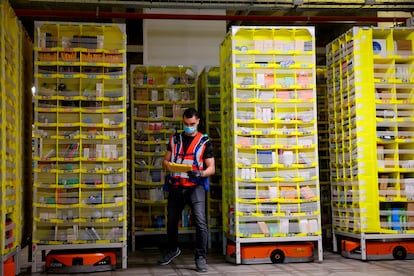This is how ‘big tech’ stifles cultural creators
Companies like Amazon, Spotify and YouTube apply a system to authors that forces them to accept tiny remuneration in order to exist digitally

When Shakira sang, “las mujeres ya no lloran, las mujeres facturan” – “women no longer cry, women cash in” – it became one of the most famous phrases of the year. But it does invite a few rectifications, starting with the fact that most female artists – along with the rest of cultural creators – earn relatively little money.
Platforms like Apple and Spotify pay artists between $0.005 and $0.01284 for each song played. Shakira may have a confidential arrangement with YouTube to bill in installments – like other popular artists – but for any other musician, the 63 million views in 24 hours of BZRP Music Sessions #53 would have netted the grand total of $43,470… $0.00069 per view, to be split between the singer, her two co-writers, the producer and agents.
The way YouTube pays for content is just one of many examples of the inequalities at work in the creative industries. More specifically, it’s an example of how big tech has hijacked the creative world – as well as the rest of society – by taking advantage of creators and their audiences.
In a book titled Chokepoint Capitalism (Scribner, 2022), Rebecca Giblin, a copyright specialist, and journalist Cory Doctorow explain how companies such as Spotify, Disney, Google, Apple, Ticketmaster, Live Nation and YouTube, plus the big three firms in the recording industry – Universal, Warner and Sony – and the five big publishers – Penguin Random House, HarperCollins, Simon & Schuster, Hachette and MacMillan – as well Meta and, of course, Amazon, have appropriated various markets. This handful of firms dominates music production and consumption, the audiovisual industry, advertising, news circulation, concert and festival tickets, video games, mobile applications, the publishing industry, audiobooks and e-books.
In the ocean, the plankton have to be healthy for the whales to survive… [but] in the music industry, we’re letting the plankton die so the whales can surviveMelvin Gibbs, music producer
As Giblin and Doctorow write, the way these companies have done this varies on a case-by-case basis. From building “licensing mazes” to hijacking regulatory bodies, from absorbing competition to slashing costs, they all seek to achieve the same thing: “block users [and] block providers [from having options] and make markets hostile to new entrants… ultimately using the resulting lack of choice to force workers and suppliers to accept prices so low that they are unsustainable.” On one side are the content producers and workers; on the other, consumers. And in the middle are the corporations installed at the bottleneck of “chokepoint capitalism,” obtaining enormous benefits from both parties.
A good example of how this bottleneck is formed is the way Amazon took over the book business, as described by Chokepoint Capitalism. Jeff Bezos’s company settled in by presenting itself as a “healthy” alternative to big chains like Barnes & Noble. However, after replacing them, Amazon began demanding more and more money from publishers, while developing the Kindle to push the companies to quickly digitize their catalogues. What Bezos didn’t tell publishers was how much he was going to sell the e-books for… he revealed the price tag 17 minutes after the device’s launch, in November of 2007. Publishers discovered that they had given up their catalogues so Amazon could sell every e-book for $9.99 – less than half the price of the physical product – while keeping most of the profit. Two years later, the platform already controlled 90% of the e-book market; it had kidnapped its buyers. The publishers ended up working for the company, instead of it working for them.
According to Doctorow and Giblin, Amazon keeps up to 60% of the retail price of the books on its platform. In theory, for publishers, working with the platform is a terrible idea. But they seem to have no choice: Amazon is currently responsible for every one in two books that are sold in the United States. And it’s not just about the books: one in two American households has Amazon Prime. According to a recent study cited by both authors, only 1% of subscribers shop around: the remaining 99% believe that other businesses cannot compete with the benefits of Amazon Prime. Vendors also assume this and end up accepting the conditions of the platform.
The more customers Amazon has, the more concessions it can get from its suppliers, who, in turn, squeeze their own suppliers – writers, editors, proofreaders, graphic designers, press officers, just to mention the publishing business – in order not to lose benefits. It’s not coincidental that Bezos has called his campaign to co-opt the book market “the gazelle project.” It was a matter, as he explained to his employees, of approaching publishers “as a cheetah would chase a sick gazelle.” Perhaps the market was not a monopoly when Amazon started in the mid-1990s, but it certainly is now. Essayist William Deresiewicz summed this situation up: “If you can only sell your product to a single [person], he’s not your client… he’s your boss.”
Amazon has the kind of power that allows it to determine who produces what, how much they receive for their work, who has access to it, what concessions the producer must make so that their product has visibility, how much the consumer is going to pay for it, how long they’ll be able to use it, how does it get to their home… more generally, Amazon gets to decide what kind of society and economic system people live in.
“The reason that creative workers receive a smaller and smaller share of the wealth generated by their work is the same reason that all workers receive a smaller and smaller share,” Giblin and Doctorow remind the reader. “We’ve structured society so that the rich get richer at the expense of everyone else.”
Prosecuting copyright infringement on the internet is necessary. However, in its current form, piracy isn’t being eliminated. Rather – as the British musician Crispin Hunt observed – copyrights are currently centralized within the tech industry, which has the complicity of regulators, streaming services and music production companies. Today, when companies install electronic locks on audiobooks, ebooks and songs, these measures aren’t really meant to protect creators – they’re meant to prevent consumers from being able to utilize these products on devices owned by competitors.
Big tech’s power goes beyond monopolies. Allowing news to be posted on social media not only weakens the position of the news media and journalists, but also forces them to produce poor-quality, biased, clickbait news. Resorting to playlists is accepting that others decide what music we listen to and why.
There are no easy answers to the question of how to reverse the disruptive and essentially undemocratic nature of big tech. But what’s interesting about Giblin and Doctorow’s book is that its authors dare to propose some potential solutions. These range from the reinforcement of antitrust regulation, to an increase in pressure on governments, so that they apply already-existing regulation against abusive practices that harm artists.
Bandcamp in music, Indyreads in the ebook and audiobook business, and Stocksy in the sale of photographic images are good examples of what positive collaboration between platforms and content producers can look like. For instance, these firms set minimum fees for creative work, while the ownership of intellectual property returns to the creators 25 years after being made available on the platforms. There are also less legal hassles for artists. “The number of mental gymnastics required to explain how the streaming of a single song finds its way into the pockets of musicians is almost bizarrely cruel,” says music critic David Turner.
Greater solidarity among members of the creative economy is also needed, starting with the most powerful actors. Taylor Swift – who shares her income from Spotify with younger artists – is a good example of how individual intervention can make a difference. Giblin and Doctorow also propose the creation of new digital tools, so that consumers can purchase quality products directly from producers. They also advocate for the end of digital locks on content, the unionization of workers in the creative industries – which flexed the power of collective action during the Hollywood writers’ strike of 2007 and 2008 – forcing Google and Facebook to pay for the content they distribute, as well as the creation of state-funded organizations that support the independent press.
More generally, the authors insist on the need for a new internet – decentralized, pluralistic, creative, more fair – and a change of mentality that makes the authorities guarantee access to artistic and creative heritage, without citizens having to go through the chokepoints of big tech. They also insist that competition regulators do their job in a stricter fashion, ensuring that powerful technology companies adhere to the transparency criteria that apply to the rest of firms and workers.
Giblin and Doctorow are not anti-capitalists. In fact, their main argument is that the chokepoint economy violates the principles of free choice and competition that are intrinsic to a market economy. Their proposals are the result of an obvious need that “the formation of monopolies, destructive extraction and the maximization of profit” be countered by policies and actors who make it possible for those who work in the creative industries to survive.
American musician and music producer Melvin Gibbs describes the current situation in this way: “In the ocean, the plankton have to be healthy for the whales to survive… [but] in the music industry, we’re letting the plankton die so the whales can survive.”
What makes culture extraordinarily important is not only the quality and relevance of its products, but also the fact that it is the test tube of political ideas and social experiments: what happens within the cultural world, sooner or later, takes place in the rest of society. This is why bottleneck capitalism should concern us: as riders and workers at Uber and other companies know, reclaiming collective property – by building citizen platforms, compensating people properly, promoting shared technology and dismantling a false “shared economy” – is a matter of life and death. It’s not just about giving back power to creative industries so that they can determine their own value… it’s also about the consumers of cultural production, who should be able to continue reading books that are off the beaten path, listening to songs that move them, seeing plays that challenge them and experiencing art that enhances their ability to go beyond themselves.
Sign up for our weekly newsletter to get more English-language news coverage from EL PAÍS USA Edition
Tu suscripción se está usando en otro dispositivo
¿Quieres añadir otro usuario a tu suscripción?
Si continúas leyendo en este dispositivo, no se podrá leer en el otro.
FlechaTu suscripción se está usando en otro dispositivo y solo puedes acceder a EL PAÍS desde un dispositivo a la vez.
Si quieres compartir tu cuenta, cambia tu suscripción a la modalidad Premium, así podrás añadir otro usuario. Cada uno accederá con su propia cuenta de email, lo que os permitirá personalizar vuestra experiencia en EL PAÍS.
¿Tienes una suscripción de empresa? Accede aquí para contratar más cuentas.
En el caso de no saber quién está usando tu cuenta, te recomendamos cambiar tu contraseña aquí.
Si decides continuar compartiendo tu cuenta, este mensaje se mostrará en tu dispositivo y en el de la otra persona que está usando tu cuenta de forma indefinida, afectando a tu experiencia de lectura. Puedes consultar aquí los términos y condiciones de la suscripción digital.









































